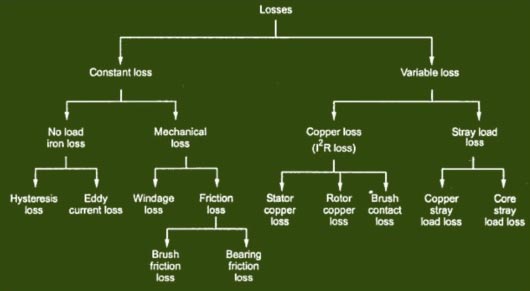The friction and windage losses in a d.c. motor depends upon ………………..
Right Answer is:
Speed
SOLUTION
As we know that in a DC machine, mechanical energy is converted into electrical energy. During the process of conversion, the total input power is not transformed into output power. Some part of input power gets wasted in various forms. These losses give in the rise in the temperature of the machine and reduce its efficiency of the machine.
For any dc. machine whether it is a generator or a motor, its efficiency is important It should work efficiently. This means that the losses must be as small as possible in d.c machines. The losses will determine the heating of the machine and hence the rating or power output that can be obtained without insulation failure. The various tests are performed to obtain information about the various losses taking place in a d.c machine.
Losses in DC machine cause 2 main effect:-
- It increases the temperature inside the machine which affects the performance and life of the material of the machine, particularly insulation. Hence, the machine rating is directly affected by the losses.
- Ultimately, losses are a waste of energy. In other words, it is a waste of money because these losses increase the operating cost of the machine.
However, losses cannot be eliminated completely. They can only be reduced to some acceptable level using proper design.
Losses in a D.C. Machine

The various losses in a d.c. the machine, whether it is a motor or a generator, is categorized amplified into three groups:
- Copper losses.
- Iron or core losses.
- Mechanical losses
- Stray Load Losses
Mechanical Losses
These losses are produced due to friction and windage (friction with air) caused by machine rotation. Hence, these are named mechanical losses. Some power is required to overcome mechanical friction and wind resistance at the shaft. They depend on the speed of the machine. The mechanical losses are also constant for a d.c. machine
Bearing friction loss generally depends on the type of bearing used and on the viscosity of the lubricant.
Brush friction loss is proportional to the contact area and the brush pressure. It also depends on other factors like the material of the brush and commutator, their polish condition, and the temperature at the contact surface.
